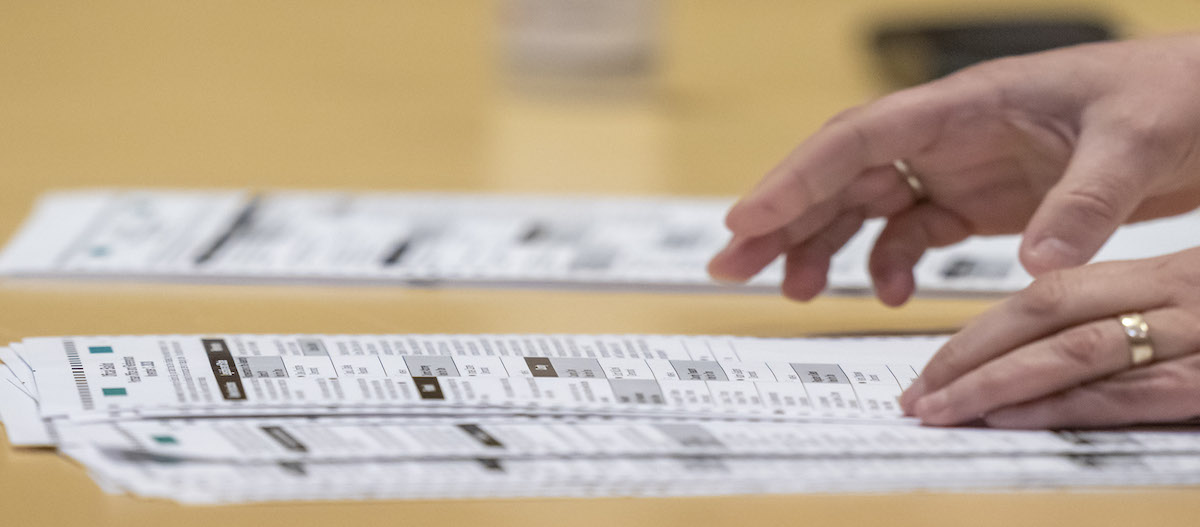
MADISON, WI – NOVEMBER 20: A election worker shows ballots to representatives for President Donald Trump during the presidential recount vote for Dane County on November 20, 2020 in Madison, Wisconsin. (Photo by Andy Manis/Getty Images)
A group of disabled Wisconsin voters sued that state’s elections department in federal court, arguing that the state high court’s ruling preventing them from seeking a third party’s help in returning their ballots violates the U.S. Constitution.
The Wisconsin Supreme Court ruled earlier this month that Wisconsin law required voters to return absentee ballots themselves, without the use of drop boxes or help from another person. The result, according to a lawsuit filed Friday by plaintiffs and Wisconsinites Timothy Carey, Martha Chambers, Scott Luber, and Michael Reece, is that disabled people are effectively barred from voting. They sued the Wisconsin Elections Commission and its administrator Meagan Wolfe, who are tasked with running the state’s contests in accordance with the law.
“[F]requently, voters with disabilities are physically incapable of placing an absentee ballot in the mail or returning it in person to the municipal clerk,” the lawsuit, filed in the Western District of Wisconsin, says. “Because of their disability, they require a third party to complete that final task in the voting process on their behalf—either by returning their ballot in person to the municipal clerk or by placing it into the mail. This practice is known as ‘ballot-return assistance.’ Without ballot-return assistance, many voters with disabilities, including Plaintiffs, would be unable to access Wisconsin’s absentee-voting program, rendering this statutorily provided method of voting unavailable to qualified voters with disabilities, even while it would remain available to other Wisconsin voters.”
The lawsuit notes that “for decades, Wisconsin Supreme Court precedent authorized Wisconsinites with disabilities to receive ballot-return assistance.” That all changed earlier this month with the state supreme court’s ruling and subsequent remarks by the Wisconsin Elections Commissioner Meagan Wolfe, who said at a press conference that “the voter is the one required to mail their ballot.”
Wolfe is a named defendant in the case.
According to the lawsuit, the ruling places an unconstitutionally heavy burden on disabled voters.
“They can no longer fully participate in Wisconsin’s absentee-voting system because their only means of doing so is now illegal,” the lawsuit says.
The plaintiffs in the case say they all have disabilities such that they cannot easily get to either their mailbox or the polls, if at all. Carey, for example, says he has Duchenne Muscular Dystrophy and is “unable to move his body.” While he says he’s able to move within his home using a wheelchair controlled with his mouth, he says he relies on a ventilator and other bulky equipment to keep him alive. He also reported having a full-time home health aid.
“Leaving his home at any time is thus an extremely risky and cumbersome task, involving mountains of medical equipment,” the lawsuit says. He is also unable to move his own hands to fill out his ballot, and needs help in doing so.
Plaintiff Chambers, who is paralyzed from the neck down due to a horse-fall accident, “cannot open her door to a mail carrier, grasp an absentee ballot to hand it to a mail carrier, place an absentee ballot in a mailbox, or hand her absentee ballot to a municipal clerk,” the complaint says. “For those final steps she must take to return her absentee ballot, Ms. Chambers needs help from someone else.”
Plaintiff Luber has muscular dystrophy and is similarly unable to deliver a ballot to a mailbox or directly to the municipal clerk; plaintiff Reece has cerebral palsy and can no longer travel to his polling place, the lawsuit says, noting that Reece’s wife has regularly returned his ballot to the clerk on his behalf.
Under the new interpretation of Wisconsin law, the plaintiff says, none of them will be able to vote in the upcoming November election.
“This is unlawful,” the lawsuit says. “Federal law guarantees that voters with disabilities enjoy full and equal access to state voting programs and thus that they are entitled to ballot-return assistance. And when a state makes it impossible for some voters with disabilities to vote at all, it violates the U.S. Constitution.”
The Wisconsin ruling fell along ideological lines, with conservatives — who disparagingly refer to the practice of delivering a ballot on behalf of another person as “ballot harvesting” — supporting a stricter voting regime. Many conservative and right-wing activists have claimed that the practice creates opportunities for voter fraud.
Allegations of widespread voter fraud and ballot harvesting among Democratic voters have failed to find factual support, and recent examples have actually implicated Republican campaigns.
Multiple states have made moves to limit “ballot harvesting” and other alternative methods of voting by passing laws described by critics as voter suppression.
Representatives from Law Forward and the Wisconsin Elections Commission did not immediately respond to Law&Crime’s request for comment.
Read the lawsuit, below.
[Images via Andy Manis/Getty Images.]